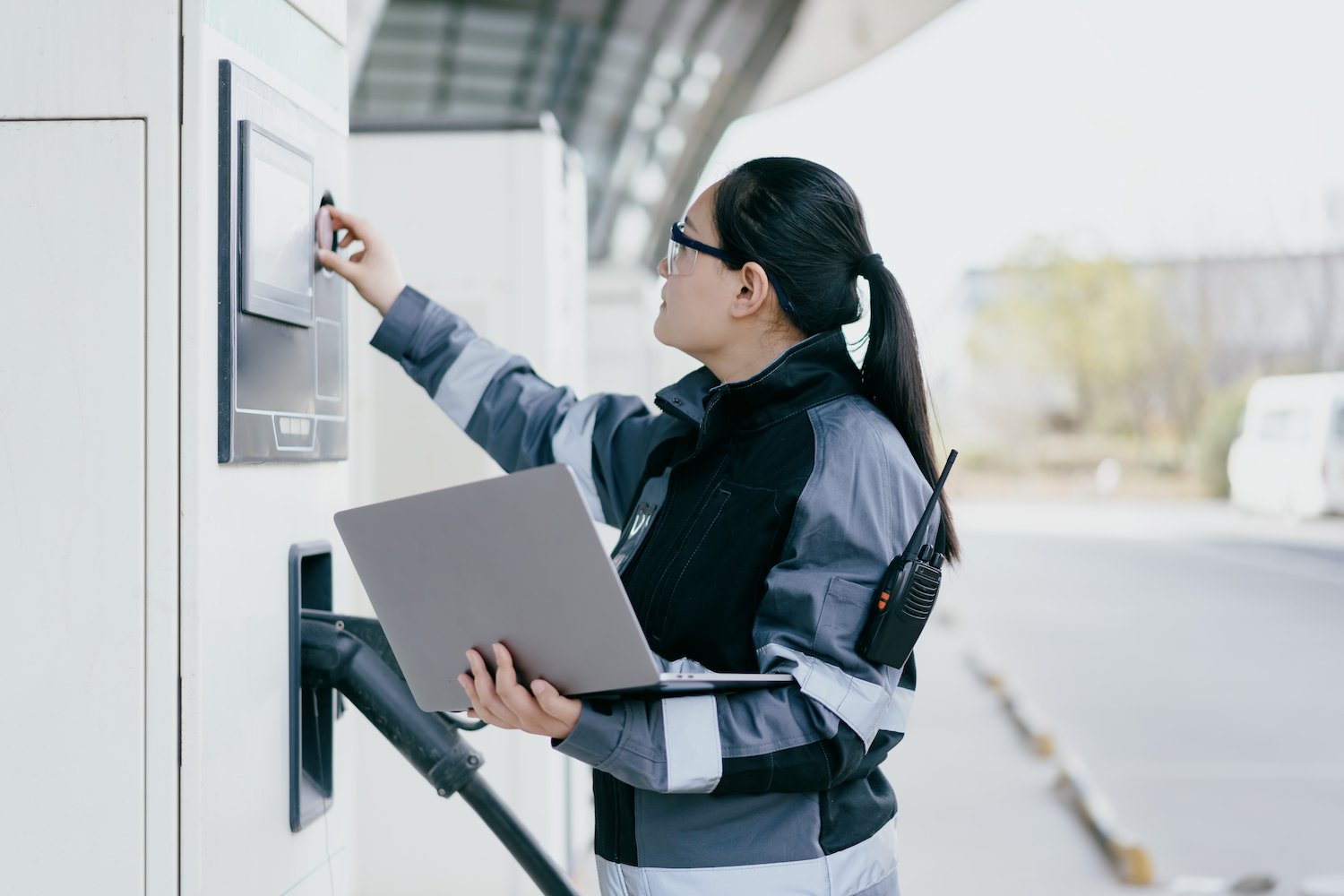The number of electric vehicles (EV) on U.S. roads is expected to reach 22 million by 2030, which will result in a dramatic increase in demand for EV supply equipment (EVSE) infrastructure. How do we meet it?

The Biggest Problem with EV Charging Infrastructure Right Now
Charging station reliability has been a big issue since the early days of EVs, largely due to lack of preventive maintenance and slow response time for fixing outages. You can often find EV charging stations around malls, big box retailers, and grocery stores, yet along interstate highways and outside of urban areas, EV charging stations can be few and far between. Those stations that do exist may or may not be fully functional when you drive up, which creates powerful “range anxiety” for EV drivers, who worry about keeping their vehicles charged on long-distance trips.
Successful infrastructure to meet the growing EV demand depends on availability and reliability. Reducing servicing costs for EVSE station owners and operators is critical to increasing both.
Regular EVSE Maintenance Reduces Costs and Increases Reliability
One way to reduce EV charging station service costs — and increase reliability — is to streamline inspections so that EVSE manufacturers and station owners can commit to an ongoing, proactive program of preventive maintenance. Proper maintenance helps minimize downtime and reduce lost revenue from non-functional chargers. Regular maintenance can also help reduce replacement costs by maximizing the useful life of charging equipment.
 More EVs need more charging stations, which means more technicians are needed to keep those stations functioning reliably and safely.
More EVs need more charging stations, which means more technicians are needed to keep those stations functioning reliably and safely.Some EV charging station manufacturers already offer total care plans that guarantee a certain level of uptime for their equipment, and this will likely become an increasingly common standard. A big challenge to implementing those plans is the shortage of experts trained to troubleshoot and maintain EVSE installations. That challenge creates new opportunities and revenue streams for local electrical professionals to install, certify, and maintain the equipment.
Tools to Simplify EVSE Maintenance
Fluke FEV150
The Fluke FEV150 EV Charging Station Analyzer is an all-in-one tool designed to make maintenance and troubleshooting more efficient and reliable for AC EV charging stations with Type 1 or Tesla-type connectors. It provides advanced diagnostics and detailed control pilot signal waveform analysis, making it an invaluable tool for installation and maintenance tasks — especially in commercial and industrial applications where complexity is greater and demands are higher.
 The Fluke FEV150 is an all-in-one handheld tool that lets a technician perform a wide range of safety and performance tests without switching between multiple tools.
The Fluke FEV150 is an all-in-one handheld tool that lets a technician perform a wide range of safety and performance tests without switching between multiple tools.The FEV150 can simulate multiple charging states and perform detailed error testing, which is crucial for diagnosing and resolving complex issues quickly. And it integrates seamlessly with the TruTest™ EV Charging software module via Bluetooth, letting you manage test results easily and generate reports quickly.
Fluke FEV100
The Fluke FEV100 EVSE Test Adapter is also essential for preventive maintenance. It’s designed to work in conjunction with other test and measurement tools, such as digital multimeters or ScopeMeters, to facilitate advanced diagnostics.
 A technician can use the FEV100 with other tools, like portable oscilloscopes and power quality testers, to check out a charging station and identify common issues as part of a preventive maintenance program.
A technician can use the FEV100 with other tools, like portable oscilloscopes and power quality testers, to check out a charging station and identify common issues as part of a preventive maintenance program.The FEV100 simulates the control pilot charging state of an electric vehicle and automates several safety and functionality tests — without an EV required. With an FEV100, a single technician can test a charger in 10 to 15 minutes.
With the FEV100, you can delegate monthly preventive maintenance inspections to a technician who has completed 5 to 10 hours of EVSE training. If everything checks out, the charger is good for another month. If the technician finds a problem that needs more extensive evaluation, they can call in a licensed electrician to diagnose and fix the problem. This reduces average servicing costs and makes it more practical for EV charging station owners and operators to commit to a regular preventive maintenance program. It also frees up more experienced electricians to address problems that require more expertise and produce more revenue.
Faster, easier EVSE troubleshooting
You get a head start on troubleshooting with both the FEV100 and FEV150, because these tools can quickly identify the most common EVSE problems.
Use the FEV100 with other test and measurement tools. Simulate multiple charging states and connect a digital multimeter, like the Fluke 87V Industrial Multimeter, to verify voltage transfer from the charger to the EV in each charging state. You can also connect the FEV100 to a ScopeMeter to analyze control pilot signal waveforms, ensuring proper communication between the EV and the charger.
The FEV150 integrates multiple testing capabilities into a single handheld device, streamlining the troubleshooting process. It performs comprehensive safety and performance tests, including advanced control pilot signal analysis, GFCI trip tests for both 6 mA and 20 mA circuits, and error detection, without requiring additional equipment. The FEV150’s automated test procedures and detailed diagnostics enable you to quickly pinpoint and address problems, ensuring minimal downtime and optimal charger performance.
Reduced EVSE service costs are key to EV growth
By delegating more EVSE preventive maintenance to skilled technicians and helping licensed electricians troubleshoot more complex problems more quickly, you can significantly reduce inspection costs. This makes a commitment to preventive maintenance programs more financially attractive to EV charging station operators and owners.
The results: more opportunities for electrical professionals to expand into EVSE support, and ultimately, a more reliable EVSE infrastructure for everyone. At last, EV drivers will be able to be confident that they can charge their vehicles wherever they drive.